copyright © Wartime Heritage Association 2012 - 2024
Website hosting courtesy of Register.com - a web.com company
Wartime Heritage
ASSOCIATION
Selected Stories of World War II
from Wartime Heritage
Chinese Checkers
It was December 1940 when Merchant Seamen of the SS Empire Industry, in port for ten days, came into the Red Triangle Room of the YMCA in Yarmouth, Nova Scotia. They held all the canteen ladies speechless with their stories and accent and when the radio operator played the piano, everyone stopped to listen and from then on, whenever he came in, a shout went up for him to play. The girls and women became so attached to these boys and men that the Sunday night committee packed Christmas boxes for thirty-five of them and collected hundreds of magazines. The day before they sailed Mae O’Brien, the hostess of the canteen, was asked to pay a visit to the ship. She took with her a game of Chinese Checkers as a gift for the ships company. The following morning the freighter left Yarmouth for Halifax where it waited for a convoy to cross the Atlantic. Mae O’Brien received four letters from ‘the boys’ while they waited in Halifax. It would be six months later in June of 1941, when she received a post card: “Dear Mrs. O’Brien: You will see from the address overleaf where the crew of the vessel who visited your club about the middle of December last, are now domiciled. I thought I would let you know and also thank you for all the kindness shown us while in your port, especially for the Christmas and New Year parcels we received, which we often think of now with longing ...” The note was written May 4th, 1941, from a German prisoner of war camp. The Empire Industry had been torpedoed on the crossing to Glasgow. A second card was to arrive from asking for a game of Chinese Checkers. Mae O’Brien sent a parcel including the requested game to these British prisoners of war. Read the full story at: http://www.wartimeheritage.com/storyarchive2/s toryempireindustry.htm
The Button
In the years following the liberation of the
Netherlands, a father shared the story of a single
button with his ten year old son. The boy, Maarten,
was watching as his mother was making clothes on the
sewing machine when he saw a shiny button in the
button box. “Mama,” he asked, “Where did this
button come from?” “I don’t know,” she replied, “you
should ask your dad” That night his father told him of
the wartime event of April 22, 1945.
“We lived in the Parish house where my father, your
granddad, was the keeper. In the spring of 1945, I
was eleven years old. We were forced to hide in the
cellar because outside there was fighting between the
Canadian liberators and the Germans. The Canadians
brought their wounded to the kitchen of our house to
care for them and your grandfather left the cellar to
help them. After the war I found the button that
belonged to a Canadian uniform jacket.”
That night, two of the soldiers died from their
wounds, Private James Jamieson of Toronto, Ontario,
and Lance Corporal Edmond Levesque, the husband of
Marie Elizabeth D’Eon of West Pubnico, Yarmouth Co.,
Nova Scotia.
Read the full story at:
http://www.wartimeheritage.com/storyarchive2/story
_the_button.htm

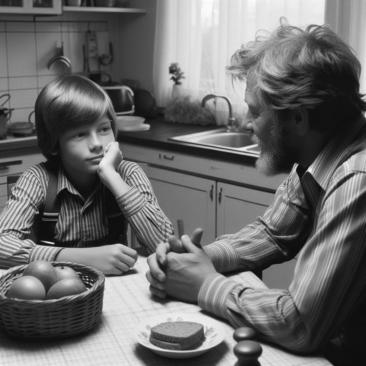
Image depicting the boy and his father
Image depicting the Red Triangle Room
A Pint of Rum
It was October 1939 and Phillip was leaving for
military training and his uncle accompanied him to
the train station. Phillip was eighteen, from
Springhaven, Yarmouth Co., in Nova Scotia. Stories
of his time at home often mentioned that he was a
very good singer and a guitar player. His uncle told
the story of his departure and of going with him to
the train station to see him off. The uncle had
purchased a pint of rum for Phillip, a little
something to have during the journey. But, not
wanting to make anyone aware of this, he
attempted to slip it into Phillip’s pocket as the
recruits were ready to board the train. Thinking he
had successful slipped the pint into the pocket
unknown to others, he let go of the bottle. The pint
fell to the ground and smashed!
Following basic training and service in Canada,
Phillip was assigned to the 3rd Infantry Brigade,
West Nova Scotia Regiment and was part of the
allied advance through Italy. He was wounded in
action on May 23 and died from those wounds the
following day, May 24, 1944.
The stories of Phillip Blanchard were among the first
collected by Wartime Heritage and have been told
throughout Nova Scotia and England over the years.
Read the Phillip Blanchard story at:
http://wartimeheritage.com/whawwii/whawwii_blan
chard_phillip_joseph.htm
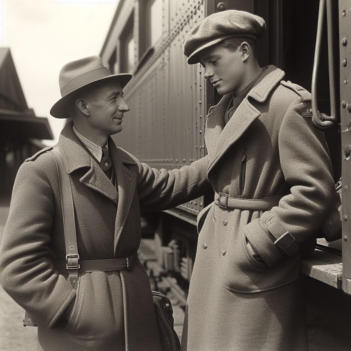
Image depicting Phillip and his uncle
This story was inspired by an actual event that
occurred during Basic Training at No. 60 CIBTC in
Yarmouth, Nova Scotia, during World War II.
Kiss Me Through the Fence
The Canadian Infantry Training Base was a place of
discipline, and rules, but love had found its way
to the edges of the camp.
Davie had been given a note that told him to meet
Annie at the camp fence. That night Annie stood
on one side of a chain-link fence and Davie, a
soldier with a heart as uncertain as the war itself,
stood on the other.
“Davie,” Annie’s voice trembled, “I enjoyed
myself last night. We’ve had so many good times
together. I think I’m in love for the first time in
my life … and it’s such a wonderful feeling!”
Davie shifted his weight, “Love is pretty serious,”
he replied, his eyes darting around to ensure no
prying eyes were about.
“Kiss me…through the fence?” Annie whispered.
Davie hesitated and then slowly he leaned in,
their lips touching briefly.
“One more?” Annie’s plea hung in the air.
They kissed again. But reality tugged at Davie’s
conscience. “If we get caught,” he murmured,
“I’ll be confined for months.”
“Just one more then?” Annie’s eyes pleaded.
Davie nodded, his heart pounding. One last kiss.
Their lips met once more, and then Annie turned
to leave. Davie watched her go and then he
turned to return to his barracks.
A voice shattered the stillness of the night. “Did
you leave the camp?” It was his buddy, Edward
walking toward him with a scowl.
“I’m not crazy!” Davie protested, relived it was
not an officer. But Edward’s eyes narrowed.
“We’re confined for ten days because of the
measles. Where have you been?”
Davie’s mind raced. “Annie arranged a meeting.
She’s in love,” he blurted out. “Couldn’t live
without me. I met her at the fence. She wanted a
kiss.”
Edward’s disbelief was obvious. “Through the
fence?” Davie nodded. “Yeah, and one kiss wasn’t
enough. She kept wanting one more!”
“Buddy,” Edward shook his head, “you’re full of
it.”
But Davie now confident. “I swear it’s the truth,”
he said. “I’m just…irresistible.”
And so, in the quiet of that night, a kiss through
the fence, became a memory, and a story retold
many times.
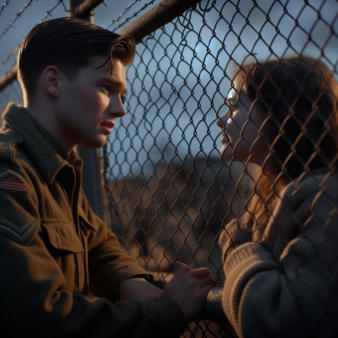
Image depicting Davie and Annie
Invasion!
There are many stories that can be told about events
in Yarmouth County during World War II. Sometimes,
with each telling a story is exaggerated and perhaps
this is one of them. Among them, a peculiar incident
unfolded at the Basic Training Camp in Yarmouth.
The camp received an urgent call: the enemy had
been sighted in the village of Comeau’s Hill.
Mobilized into action, soldiers headed there with the
RCAF from the Yarmouth airbase patrolling overhead.
As the soldiers returned to their barracks, they
swapped stories. Three huddled together, recounted
the chaos. One spoke with wide-eyed intensity. “The
way it all started, it was panic, I thought it was for
real. Orders being shouted like never before. Move
here, move there, search here, search there! And
did you see the faces of the people? Imagine being
invaded by the Canadian Army. Someone said the
enemy was coming, but all they got was us! But we
proved we could defend the place.”
His buddy, grinning mischievously, interjected, “You
mean clean blueberries off the bushes! I saw you two
filling your face. I was crawling over this ridge, and I
heard rustling in the bushes. Decided I would check it
out, figured I found ‘em. So, over the ridge I go and
instead of finding the enemy, here are you two
stuffing your faces with blueberries!”
With a sheepish reply, “Well, they were good, and we
had a good feed … and it was good practice!”
And so, in the annals of wartime history, the Battle of
Comeau’s Hill became legendary—not for heroics, but
for berry-picking prowess. The soldiers, with
laughter echoing, proved that sometimes the smallest
victories matter most.
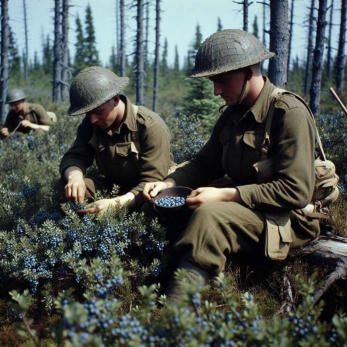
Image depicting the soldiers
September 1939: The Freighter
The afternoon sun cast a pale glow over Yarmouth,
Nova Scotia. Sarah sat at the kitchen table, her head
held in her hands. The radio droned in the
background, its voice a somber reminder of the
world beyond.
Harold, her husband, shuffled into the room with his
lunch box and a newspaper. The radio’s static-filled
voice continued.
“Terrible, isn’t it?” Sarah whispered; her eyes fixed
on the radio. “Every word, every threat, it scares
me.”
Harold grunted, reaching for the dial. He twisted it,
silencing the broadcast. “If it scares you, why
listen?”
Sarah sighed. Harold settled into the chair across
from her, the newspaper spread open.
“Home early today,” she observed. “Supper’s not
even started. Shall we have a cup of tea?”
He set the paper down, weariness etched into his
features. “We loaded as much lumber onto the
freighter as we could. Pulled out of port half an hour
ago.
Sarah looked at Harold questioning, “You said this
morning that it would take two more days. You
couldn't have finished.”
“We're not sure what was going on. Strange fellow
that Captain.”
Sarah leaned forward. “Strange how?”
Harold’s voice dropped. “He's been frantic all day.
He kept the crew aboard, steaming up the ship since
midday. Insisted we load more lumber, worked
through dinner. suddenly yells for the deckhands to
cast off the lines, and the next thing we know the
ship is pulling away with half the cargo still on the
dock.
“Doesn't sound very sensible to me,” Sarah
exclaimed. “What was the rush?
“Rumor has it, the captain received orders from
Germany.”
“Germany?” Sarah’s mind raced.
“That's what the foreman said.” Harold continued,
“Also heard the militia from Weymouth is moving
down here to Yarmouth to guard that field where the
new airport will be.
“Out near Arcadia?” Sarah asked.
“Yes,” Harold confirmed. “And this afternoon, I
heard a plane fly over the town.”
“It’s coming,” Sarah replied with a concerned look,
“War. And no one can stop it.”
The following day, Britain declared war on Germany.
Sarah and Harold are fictional characters; however, the
story of the freighter is factual as is the reference to the
Weymouth Militia. The scene of Sarah and Harold opened
the Wartime Heritage (440 Production) stage performances
of “Until We Meet Again” in May of 1997.

Ray and Jenny are fictional characters; however, the story of
the periscopes is factual. The scene of Ray and Jenny was
part of the Wartime Heritage (440 Production) stage
performances of “Until We Meet Again” in May of 1997.
The Periscope
The clouds hung over the calm sea. Jenny and Ray
stood at the edge of the rocky coastline, peering out
into the vast expanse of water.
“Look way out there. What is it?” Jenny asked,
squinting her eyes.
“Probably a ship,” Ray responded, his hands shielding
his eyes from the sun’s glare.
“No, it’s something sticking out of the water,” Jenny
insisted, pointing towards a small, cylindrical object
that bobbed gently with the waves.
“A submarine periscope,” Ray said, a hint of
excitement in his voice.
“Really?” Jenny’s eyes widened with curiosity.
Ray nodded. “There’s supposed to be German Subs all
along the coast. Maybe that’s what it is.”
“Do you really think so?” Jenny pondered the
possibility. “I wonder what it must be like to live
under the water.”
“Not too exciting if you ask me,” Ray shrugged.
Jenny considered this for a moment. “Well, if it’s a
submarine, shouldn’t we tell someone?”
Ray shook his head. “Not much point. It would be long
gone by the time anyone got around to checking it
out.”
Jenny bit her lip, the thrill of the unknown tugging at
her. “Let’s just watch it for awhile.”
They settled down on the rocks. The periscope
remained a silent sentinel in the distance.
During the Second World War, off the coast of
Yarmouth, Nova Scotia, periscopes were often seen by
fisherman and citizens of the town, as German
submarines patrolled along the Atlantic shoreline of
Nova Scotia.
113 Squadron flew Lockheed Hudson aircraft on anti-
submarine patrols from RCAF Station Yarmouth. After
a year and a half at Yarmouth, 113 Squadron moved
on to Sydney, Nova Scotia. The Hudson aircraft of 113
Squadron were later replaced with Ventura aircraft
Detachments of five aircraft were stationed at Mont
Joli, Quebec and Moncton, New Brunswick where they
flew anti-submarine reconnaissance patrols over the
Gulf of St. Lawrence and the shipping lanes off Halifax
Nova Scotia. In July of 1942, S/L Small of 113
Squadron sank the first submarine in Eastern Air
Command off Cape Sable
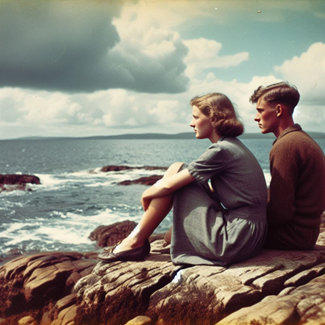

The Little Girl’s Secret
Sylvia heard a single plane flying in low. She knew the
plane was not Allied, but German, as she saw yellow
paint. The aircraft turned around and came back
firing its guns. “I rushed my brother in behind a
concrete pillar, under the bathing station and hid my
brother and myself. The sound was very loud, as the
pilot emptied his guns into the pillar. We stayed
hidden until the firing stopped.”
Sylvia looked out with care and watched the plane fly
out over the sea and the two went back to playing in
the sand.
She didn’t want to tell anyone what happened that
Sunday morning in Bournemouth. “I thought we would
get into trouble. Now at the age of 88, I thought it
may be of interest.”
Read the full story at:
http://www.wartimeheritage.com/storyarchive2/story
_little_girls_secret.htm


Image depicting Sarah and Harold
© WHA
© WHA
© WHA
© WHA
© WHA
© WHA
© WHA
Image depicting the girl and her brother
© WHA
Image depicting Jenny and Ray
The Silent Echo of the Mountain
There seemed to be a change of course to the left, a
sudden increase in engine speed, a tremendous roar.
The aircraft fought its way upward from the heart of
the valley The pilot’s knuckles whitened as he
wrestled with the controls, desperate to overcome the
looming mountain peak.
Sparks of flame erupted from an engine, painting the
night sky with fiery streaks. And then, an enormous
explosion, a searing burst of light that illuminated the
mountaintop.
The night was no longer silent. It was marred by fire
and continuous explosions that echoed through the
valley. There would be no survivors.
As dawn approached, partisans arrived at the crash
site. The mountain was now a battlefield of twisted
metal and scorched earth. They saw scattered
wreckage, shattered wings, mangled fuselage, and the
remnants of what was once an aircraft.
The RAF circular identification painted on the aircraft
remained un-marred, a testament to its origin. Twelve
bodies, all victims of the horrific crash and fire, were
laid out for burial. And there, at the edge of the
wreckage, one crew member, remained untouched by
the fire. A villager at the crash site recalled the
“handsome blond boy who seemed to be sleeping.”
The partisans worked tirelessly, digging a mass grave
near the crash site. Two salvaged tubular containers
became a simple cross, and marked their final resting
place, a silent testament to the price of war.
As the sun climbs higher, casting its light upon the
mountain, the echoes of the explosion have faded, but
the memory of the long past night lingers as a
haunting whisper carried by the wind. A monument to
remember the thirteen men and their sacrifice
remains, forever a part of the mountain’s silent echo.
In memory of the crew and SOE personnel of Halifax II
BB412, 148 RAF Squadron.
Read the full account at:
http://www.wartimeheritage.com/storyarchive2/story
_in_defence_of_freedom_HalifaxIIBB412.htm
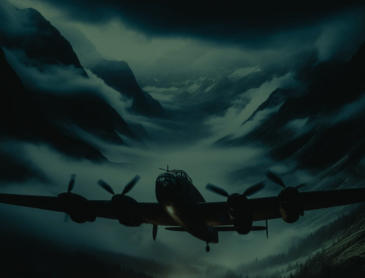
Image depicting the Halifax II aircraft
© WHA
Unsung Heroes of the Jungle
As the plane descended, billowing smoke trailed
behind it. Burmese villagers watched as the aircraft
plummeted through the thick jungle canopy. The odds
of any survivors seemed slim. Yet, against all
probability, the plane crashed into a small clearing
amidst the dense foliage. Blood trickled down the
pilot’s forehead, and darkness closed in.
The villagers rescued the still-living pilot from the
wreckage and their thatched-roof village became his
sanctuary. Japanese soldiers prowled the jungle, and
the threat of discovery hung over them as a constant
menace. But the villagers were resolute, they would
shield the pilot from the enemy at all costs.
As they tended to the wounded airman, he slowly
regained his strength. However, he soon realized he
was stranded behind enemy lines, with little hope of
escape on his own. The villagers, undeterred by
danger, convinced him they could protect him if the
Japanese ever reached their village.
Days turned into weeks, and weeks into months. The
villagers remained steadfast in their determination to
protect the airman.
Eventually, allied troops rescued the pilot, guiding him
through enemy territory back to safety. He would
forever attribute his survival to these unsung heroes of
the jungle, ordinary people who defied the odds and
showed extraordinary courage.
Read the full story of Wing Commander Roger Henry
Tupper, RCAF- Air Operation Over Burma at:
http://www.wartimeheritage.com/storyarchive2/story_
tupper_operation_over_burma.htm

Image depicting Burmese villagers
© WHA















